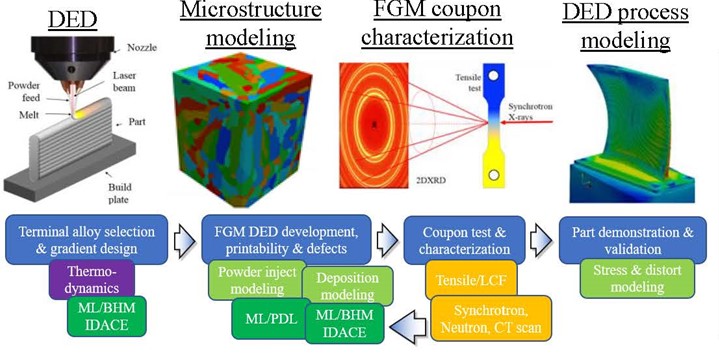
EWI, GE Research (GER), and the University of South Carolina (U of SC) have just begun a $5 million program funded by the Department of Energy in which machine learning is used to develop the process for building a functionally graded material for energy applications.
The specific goal is to develop net-shape manufacturing technologies for high γ’ to low γ’ nickel superalloy functionally graded materials (FGM) using laser-blown powder directed energy deposition (L-DED) for manufacturing hot-and-harsh gas path (HGP) parts in gas turbines or jet engines. The objective is to reduce material and manufacturing costs by 10-20% and improve durability by 20-30%. The program is summarized in Figure 1.
To successfully build this challenging FGM, the team is developing a systematic process which can be extended to other material combinations. Several of the planned developments are highlighted below.
Faster Development
The parameter space for DED FGMs is extensive. It includes the parameters to build each terminal alloy as well as the strategy and associated parameters for the transition region. Further, for precipitation hardened materials, thermal post-processing must be considered from the outset. Finally, the interaction terms between process parameters are known to be strong.
To efficiently work in this complex space, GER’s Bayesian Hybrid Model (BHM) and Intelligent Design and Analysis of Computer Experiments will be applied. These methods are a probabilistic approach which allow the inclusion of modeling results.
Process-Monitoring for Model Validation
As inputs into the BHM, U of SC is developing microstructural and defect models and GER is developing stress and distortion models. These models are being validated against process monitoring at EWI and beam-line characterization at Oak Ridge National Lab and Argonne National Lab. EWI is advancing its L-DED process monitoring to facilitate better data registration between sensor measurements, modeling results, and characterization results.
Process Modifications:
EWI process experts have identified process improvements for FGM buildability. Concepts include a heated build plate, modified powder mixing, and laser stirring. These modifications should mitigate crack formation causes such as residual stress, but they further complicate the parameter space. Modeling and machine learning will be used to guide their use.

If you are interested in learning more about this program as it progresses, please contact Alex Kitt, EWI Director of Data Science, at [email protected].
Acknowledgment: This material is based upon work supported by the Department of Energy under Award Number DE-EE0009118.